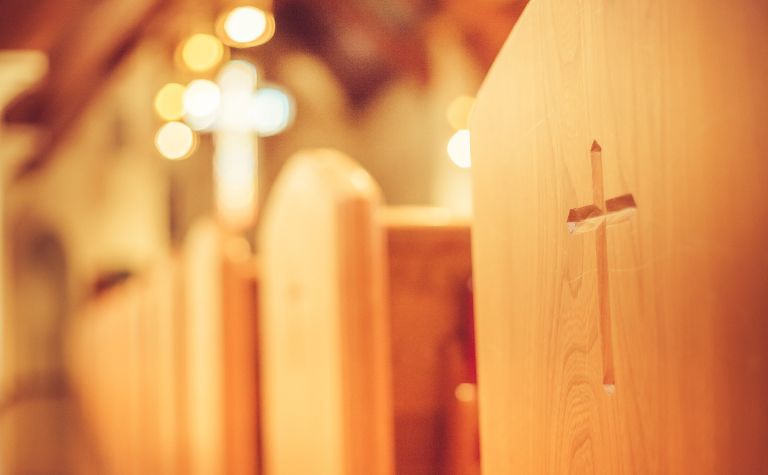Christmas is an important time of year for most Christians because it’s when they celebrate the birth of Jesus Christ. However, some religious traditions don’t celebrate Christmas because adherents believe it’s pagan, worldly, and superstitious. A lot of people wonder if Pentecostals celebrate Christmas or refrain from it.
Pentecostals celebrate Christmas to remind them that God became a human being in the person of Jesus Christ to save sinners like them. Traditionally, Pentecostals sing Christmas carols, exchange gifts with loved ones, and decorate trees in their homes. Worshipping Christ, however, is their utmost priority.
What exactly do Pentecostals celebrate at Christmas? Wasn’t Jesus born in the Spring? Doesn’t Christmas have pagan roots? How do Pentecostals respond to religious organizations that say it’s wrong to celebrate Jesus’ birth? Keep reading to learn the answer to these questions and others.
Also, see Do Pentecostals Believe Jesus Is God? to learn more.

Christmas in the Pentecostal Tradition
Most Pentecostals belong to the Protestant theological tradition. This fact means that they believe and defend the core doctrines of the Christian faith, like the Trinity, the inspiration of Scripture, original sin, the atonement and resurrection of Christ, and the Second Coming.
They also believe in the incarnation, when the second person of the Trinity was born to Mary and called Jesus of Nazareth. (Also see Do Pentecostals Speak in Tongues?)
What do Pentecostals celebrate at Christmas? First, Pentecostals celebrate the incarnation of Christ and reflect on verses like John 1:14, “And the Word became flesh and dwelt among us” (ESV).
They also read the birth narratives of Christ as recorded in the Gospels of Matthew and Luke. So Christmas for Pentecostals isn’t only about Christ’s birth but why he was born, which was to seek and save the lost (Luke 19:10).
“While they were there, the time came for her Child to be born. And she gave birth to her firstborn, a Son. She wrapped Him in swaddling cloths and laid Him in a manger, because there was no room for them in the inn.” (Luke 2:6-7, ESV)
Wasn’t Jesus born in the Spring? Some scholars believe Christ was born in the Spring, not December 25. However, like other Protestant Christians, most don’t have a strong opinion about the exact day of Christ’s birth. Furthermore, Christians should reflect on, and celebrate, the incarnation all year round, not just on one day.
In essence, worshiping God, thankfulness to Christ, and loving others are most important, not pinpointing the exact date. (Also see Can a Pentecostal Marry a Catholic?)
Doesn’t Christmas have pagan origins? Some aspects of Christmas celebrations have pagan roots, like Christmas trees, although most Pentecostals and most other Christians aren’t aware of them. The heart, motive, and faith of the person are what matters.
The members of religious traditions that don’t celebrate Christmas still wear wedding rings, which have pagan origins. [1] They also use the word “Thursday,” which has pagan roots.
The name is derived from Old English þunresdæg and Middle English Thuresday (with loss of -n-, first in northern dialects, from the influence of Old Norse Þórsdagr) meaning “Thor’s Day.” It was named after the Norse god of Thunder, Thor. Thunor, Donar (German, Donnerstag) and Thor are derived from the name of the Germanic god of thunder, Thunraz, equivalent to Jupiter in the interpretatio romana. [3]
If a person in a religious tradition is asked why they use the word “Thursday” since it has pagan origins, the answer will probably be that they were unaware of its roots, and it doesn’t carry that meaning when they use the word.
Also, see Why Do Pentecostals Say Holy Ghost? to learn more.

Should Christians Celebrate Christmas or Not?
One of the most well-known religious traditions that don’t celebrate Christmas is the Jehovah’s Witnesses. But, importantly, neither Pentecostals nor other Protestants consider Jehovah’s Witnesses Christians because they deny doctrines like the Trinity, the deity of Christ, and the penal-substitutionary atonement of Christ on the cross.
Responses to Jehovah’s Witnesses’ arguments: the lefthand column gives readers word-for-word explanations taken directly from the teachings of the Jehovah’s Witnesses organization. [2] (Also see Pentecostal vs. Baptist: What’s the Difference?)
The right-hand column offers a Christian response. Readers are encouraged to explore the arguments and their answers in more depth. The table is simply a starting point for understanding the critical points in the discussion.
| Jehovah’s Witnesses Argument | Christian Response |
|---|---|
| Holidays are rooted in the belief in or worship of other gods | Christians don’t worship false gods, but only the one true God who exists in three persons: the Father, Son, and Holy Spirit. |
| Holidays that are based on superstition or on the belief in luck | Holidays that are based on superstition or the belief in luck |
| Holidays are linked to the occult | Celebrating Christmas is a way to enhance obedience to Christ through reflection on and reminders of, biblical teaching. |
| Observances related to worship under the Mosaic Law, which ended with Jesus’ sacrifice | Pentecostals don’t traditionally celebrate Old Testament holidays, though it’s noteworthy to some that Jesus was at the Temple during Hanukkah (John 10:22-23). |
| Celebrations of a religious figure or events that encourage united worship among people with different religious beliefs | Pentecostals don’t participate in inter-faith worship services. |
| Observances that are based on religious traditions not endorsed by the Bible | Celebrating Christmas is a way to enhance obedience to Christ through reflection on and reminders of biblical teaching. |
| Does the holiday exalt a human, an organization, or a national symbol | Pentecostals seek to exalt Christ (who is human) at Christmas. Some Pentecostals, like other Christians, limit the influence of legendary figures like Santa Claus or Rudolph the Red-Nosed Reindeer. |
Pentecostals celebrate Christmas to exalt God in the person of Jesus Christ. Neither their beliefs nor their practices reflect pagan spirituality.
Like other Christians, many Pentecostals strive to make Christ the center of their celebration, not focusing on the secular aspects (e.g., Santa Claus) or material ones (e.g., presents).
Also, see Pentecostal vs Lutheran: What’s the Difference? to learn more.

References:
[1] Source
[2] Source
[3] Source
Related Questions
Many people know that the terms "Pentecostal" and "evangelical" are associated with Christianity, but they aren't sure exactly how or what the difference is between them. The words may refer to a set...
The Pentecostal and Baptist traditions are two of the most prominent branches of Protestant Christianity. They have many beliefs and practices in common and have more similarities than differences....
